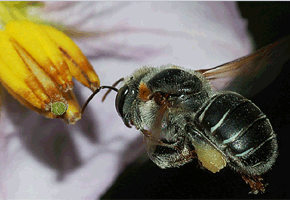

Research highlights concerns about pollinators, whose decline has disastrous consequences for both biodiversity and agribusiness
Research highlights concerns about pollinators, whose decline has disastrous consequences for both biodiversity and agribusiness.
Research highlights concerns about pollinators, whose decline has disastrous consequences for both biodiversity and agribusiness.

Research highlights concerns about pollinators, whose decline has disastrous consequences for both biodiversity and agribusiness
By Fábio de Castro
Agência FAPESP – Because of their critical role in the conservation of biodiversity and agriculture, pollinators are a worldwide concern. The book Polinizadores no Brasil – Contribuição e perspectivas para a biodiversidade, uso sustentável, conservação e serviços ambientais [Pollinators in Brazil—Contribution and prospects for biodiversity, sustainable use, conservation and environmental services], released on July, aims to classify the knowledge acquired on the topic in Brazil over recent years.
Produced by the Environmental Services Research Group at the Universidade de São Paulo Institute of Advanced Studies (IEA-USP), the book is the result of studies involving 85 researchers from 36 scientific institutions with the goal of understanding the current status of pollinators in Brazil, their impact on agriculture, biodiversity and agribusiness.
The publication derives from studies funded by the National Council for Scientific and Technological Development (CNPq) and by the Agribusiness Sector Fund. These studies, in turn, were based on the results of the Thematic Project “Biodiversity and sustainable use of pollinators, with emphasis on Meliponini bees,” coordinated by Vera Lucia Imperatriz Fonseca and conducted as part of the BIOTA-FAPESP program.
Fonseca, the coordinator of the IEA Group, was also the principal editor of the book. The co-editors and vice-coordinators of the group were Antonio Mauro Saraiva from the USP Polytechnic School and Dora Ann Lange Canhos from the Reference Center on Environmental Information (CRIA). Fonseca is currently a visiting senior professor at the Universidade Federal Rural do Semiárido.
“The Thematic Project, which was completed in 2010, was very successful. In addition to facilitating the training of specialists, it continues to produce results in the form of publications and theses. The book is the first document in the Portuguese language that discusses the current knowledge of pollinators in Brazil, both in natural areas and in agro-ecosystems,” Fonseca told Agência FAPESP.
According to Fonseca, the quality of the research done for the Thematic Project was recognized by the Brazilian Federal Agency for the Support and Evaluation of Graduate Education (Capes), winning an honorable mention in the 2011 edition of the Capes Thesis Prize and two nominations for the 2012 edition.
Fonseca says that the worldwide concern over pollinators has increased because decreases in pollinator numbers threaten disastrous consequences not only for biodiversity but also for agribusiness.
The risks of losing pollination services are especially serious if agriculture depends on one species of pollinator. “The book is being published at an important point in time when the disappearance of bees is beginning to be noted in Brazil as well,” said Fonseca.
According to her, the disappearance of bees was detected in the Northern Hemisphere in 2007. In North America, 30% of colonies have been lost every year. As a result of these losses, it has become necessary to import bees to provide pollination for agriculture. In the European Community, the loss of bees has been extensive and worrisome. Brazil’s first cases were detected in 2011.
“The book aims to focus on the issue within Brazil but includes an overview of the global situation, with a proposed strategy for developing the subject in Brazil,” said Fonseca.
Human activity
According to Fonseca, the book does not entirely exhaust the subject, but it covers an unprecedented cross-section of the Brazilian community in terms of studies on bees and pollinators. “Aside from the results of our studies, the book also aims to formulate public policy for pollinators,” she said.
Topics such as the importance of agricultural landscape in the maintenance of pollinator services and the need to increase the number of biological collections for the study of bee fauna are among the book’s primary emphases. The work also addresses invasive species and the effect of human activity on the conservation and use of pollinators.
“Another focus is the question of bee disappearance, a persistent theme of the book. We are beginning to learn more about this topic. The book shows how the disappearance could be connected to changes in human behavior—like the increased use of pesticides—and climate changes that can break up populations of these animals,” explained Fonseca.
The first part of the book consists of a study on the conservation of biomes, pollinating syndromes, and vertebrate pollinators, including an unprecedented list of these animals made by Brazilian specialists.
“The following sections include a series of articles that discuss such pollinators as beetles and moths but that focus on bees, the pollinators most managed by agriculture,” said Fonseca.
The articles also discuss plant and pollinator databases, methods for evaluating biodiversity, pollinator collections and the process of digitizing them, and the creation of catalogued pollen collections and their importance in the management of pollinators.
“The book also presents a series of case studies that use predictive modeling as a communication method with decision makers, touching on climatic events anticipated by the IPCC. All the modeling was developed within the Thematic Project,” said Fonseca.
Republish
The Agency FAPESP licenses news via Creative Commons (CC-BY-NC-ND) so that they can be republished free of charge and in a simple way by other digital or printed vehicles. Agência FAPESP must be credited as the source of the content being republished and the name of the reporter (if any) must be attributed. Using the HMTL button below allows compliance with these rules, detailed in Digital Republishing Policy FAPESP.





